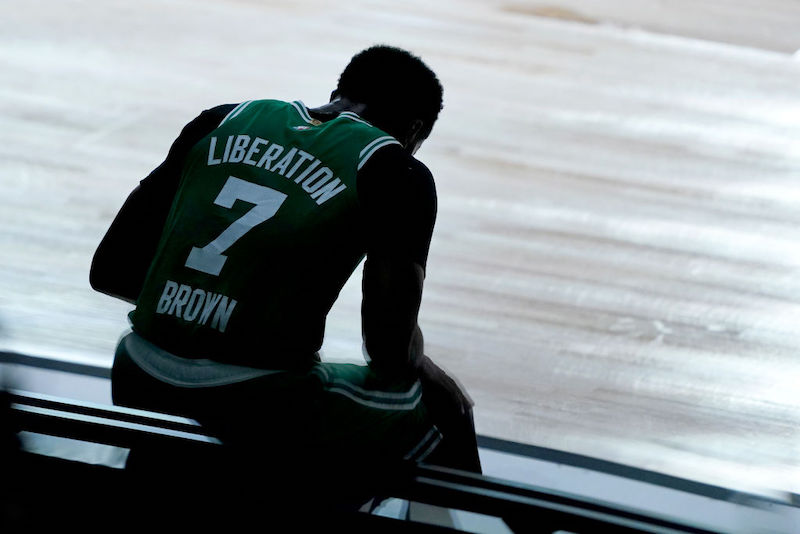The moment the enormity of the COVID-19 pandemic became apparent to me, and also probably millions of other Americans, was the night of March 11, when the NBA abruptly halted its season after Rudy Gobert tested positive for the virus. Sports, as constructed for a world not in the throes of a pandemic, provided the first signal that daily life as we knew it was about to become something very different.
The world of six months ago feels incomprehensibly distant. Not only has American leadership shrugged its shoulders at a spiking death toll, a nationwide uprising broke out following the death of George Floyd as the inherent brutality and injustice of the American police state roared to the center of the national consciousness. In restarting its season in ways meant to accommodate for a pair of seismic societal shifts, the NBA sought to demonstrate its ability to carry on through any crisis. Ironically, what the league has since provided us with is a fresh understanding its limited stability.
Despite players like Fred VanVleet openly saying that, morally speaking, “The right thing to do is to not play,” most of the players showed up to the bubble in Orlando and went along with the NBA's proposed solutions for playing through both a pandemic and nationwide upheaval. For the pandemic: a rigid daily testing regimen and an imporous border. For players’ need to support social justice movements they believed in: “Black Lives Matter” emblazoned on the court and 29 league-approved messages on jerseys.
For a little while, the NBA managed to establish a facade of normalcy in the bubble. Even if ESPN's broadcast of the games, which featured protest footage repackaged into a plug for Beyoncé's new album—available exclusively on Disney+!—made anyone feel a little queasy, it was maybe hard to dwell on those feelings for too long while there was so much exciting basketball to watch.
Then came Wednesday’s wildcat strike, initiated by the Milwaukee Bucks, which proved definitively that the players themselves had not stopped dwelling on what was happening outside the bubble. Before the strike, NBA players from several teams openly discussed the trauma and pain they felt from witnessing the shooting of Jacob Blake by Kenosha police. Celtics swingman Jaylen Brown said, “[T]hose emotions are real. That is real. Yes, we’re athletes. Yes, we’re being paid to play a sport that we love. But we are human beings, members of our community. We are fathers, uncles, nephews, brothers, et cetera. So all those emotions are real and I don’t really have a lot to say.” The weight of being in the bubble while a horror like the Blake shooting happened was summed up in the Bucks’ team statement, read by Sterling Brown and George Hill, which said, “Our focus today cannot be on basketball.”
One of the questions being asked both, directly and indirectly, by players has been: Should anyone’s focus be on basketball, right now, amid such awful times? On Wednesday night the players made it abundantly clear that the state of the world was simply too much to bear, and that sports, for all the outsize influence they hold over American society, are not unlimited in their capacity to carry on through all obstacles.
It is not a bad thing to come to this realization. Sports leagues love nothing more than to have themselves held up as a guiding wind for the nation, a force that can lead fans and citizens through troubled times. Sad about 9/11? Here's George W. Bush throwing a heater over the plate in Yankee Stadium. Not in the mood for entertainment while police beat and teargas people in the streets? Here's an NBA game with a bunch of guys wearing EQUALITY on the backs of their jerseys.
When sports are deployed in this manner they accomplish what all good propaganda does: a dulling of the senses to everything that's actually going on in the world. What's remarkable about the events of the last 48 hours is how swiftly and forcefully that process was halted. The NBA had been doing its job: the games were entertaining us, the fire of the protests was being properly metabolized into corporate-approved social justice messaging, and praise for the league's savvy navigation of the pandemic was piling up. And then, just as quickly as a single positive COVID-19 test had derailed the season in March, a spasm of anguish within the Bucks' locker room snapped the league out of its peaceful, waking dream.
The games will almost surely resume, sooner rather than later, but that doesn't mean the lessons of this week need to be forgotten. The power of sports leagues is not ordained, and a return to normalcy is not inevitable. The gears can be dislodged by whoever chooses to do so.
This blog was originally published in a newsletter on August 28.






